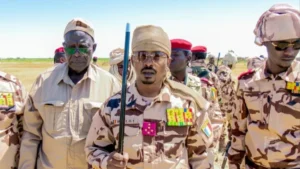
At least 40 soldiers from Chad lost their lives in a brutal attack on their base on Sunday evening, according to a statement from the presidency.
In response, President Mahamat Déby has initiated a counter-offensive aimed at capturing those responsible for the assault.
The attack took place on Barkaram Island, located in a vast marshy area that was once part of Lake Chad, which has dramatically receded over the past several decades.
While the presidency’s statement does not name any suspects, the region is known for its proximity to the borders of Nigeria and Niger, where Islamist militants are active.
Recent United Nations reports indicate that over 220,000 individuals have been displaced due to years of violence and insecurity stemming from armed groups in the area.
This incident marks one of the most significant losses for Chadian forces since 2020, when a raid resulted in approximately 100 military fatalities, prompting a military operation against Islamist militants by then-President Idriss Déby.
Local sources informed AFP that they suspect Boko Haram—a militant Islamist group based across the Nigerian border—was behind this latest attack. They reported that at least 200 soldiers were stationed at the garrison during the assault.
The attackers reportedly had time to seize ammunition and equipment before retreating, according to AFP.
This assault represents a significant setback for President Déby, who is trained as an elite soldier and is the son of the former president, who was killed in combat with rebels three years ago near the Libyan border.
The Chadian presidency has portrayed Déby as a proactive leader with military expertise. He visited the site of the attack early Monday to “assess the situation on the ground, pay respects to the deceased soldiers, show compassion to the wounded, and uplift the morale of his brothers-in-arms.”
The Lake Chad basin, bordered by Cameroon, Chad, Niger, and Nigeria, is home to a Multinational Joint Task Force aimed at combating the armed groups in the region.
However, the International Crisis Group warns that militant Islamists “often regroup when troops withdraw,” indicating a need for improved funding and strategic planning.
In recent years, several coups have occurred in the region, including in Niger, Mali, and Burkina Faso, with military leaders citing their inability to address the Islamist militant threat as a reason for ousting civilian governments.
Analyst Paul Melly notes that Chad remains a stable partner with Western nations amidst numerous regional crises, while also expanding its relationships with Russia, a move that raises concerns for France and the U.S.
Chad is also reported to be a key conduit for arms flowing into Sudan, a claim it denies, while hosting large numbers of refugees from the civil war in Sudan in camps near its eastern border.






